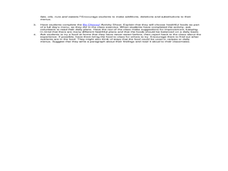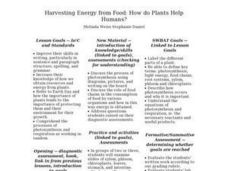Curated OER
Super K Buffet: Lesson for Kindergarten
Students determine healthy food choices. In this healthy food choice lesson, students study food vocabulary and complete a worksheet about making good choices. They put together a dinner plate that shows a complete meal using a foam...
Curated OER
How Do Foods Help Our Bodies
Students investigate the specific elements found in food that keep us healthy. In this healthy eating lesson, students identify proteins, carbohydrates, minerals, and vitamins as part of a healthy diet when consumed in moderation....
Curated OER
Farm Products Help Me Grow
Students view a display of empty food containers (or illustrations). They select a food and decide as a class if it has an animal or plant origin. Students view a display of common farm animals that are commonly eaten (cow, pig, chicken,...
Curated OER
The Dangers of Being Obese/Overweight
Third graders determine if they are eating healthy. For this healthy living lesson, 3rd graders watch a video titled Happy Health and review the food pyramid. Students create a spreadsheet where they list their food intake for the week...
Curated OER
Nutrition
Students examine nutrition and their own eating habits. In this healthy eating instructional activity students participate in several activities that include building a food pyramid and analyzing it.
Curated OER
From Moo to You
Students listen to a story about cows and identify foods made from milk. They have a tasting party and practice a finger play called "Five Mugs of Milk."
Curated OER
Comparing the Food Choices and Body Image of 15-Year-Olds Around the World
Students interpret data regarding food choices and the perceived body image of youth in the world. In this personal health lesson, students compare food consumption patterns in Canada with other countries. Students also compare lifestyle...
Curated OER
Foods and Languages of the World
Students celebrate diversity. In this multicultural appreciation lesson, students celebrate diversity by sampling food from different cultures, learning a few words in Spanish and identifying the seven different continents.
Curated OER
Our Five Senses Affect Food Choices
Students read My Five Senses: A Lion's Tale. In this five senses lesson, students understand the relationship between their five senses and how they affect their food choices. Students write journal entries about their senses and the...
Curated OER
Harvesting Energy from Food: How do Plants Help Humans?
Beginning botanists view slides of plant vascular tissue. They watch Magic School Bus Gets Planted, which you can find online, and then write a summary of what they have learned about plants. This lesson could be used with upper...
Nemours KidsHealth
Obesity: Grades 6-8
Screen time and fast foods, sugary drinks and greasy fries have lead to one-third of tween and teens being overweight or obese. As part of the Health Problems Series scholars analyze the nutritional value of the school food services menu...
Las Cumbres Observatory
Astronaut Training: Taste
Gravity isn't the only thing astronauts lose in space. Learners investigate why astronauts complain about a loss of taste while in space in a hands-on activity. They taste test foods while limiting their other senses and rate each food...
Curated OER
Appositives and Present Participle Phrases (-ing word groups)
Combine sentences with the help of this grammar resource! Learn how to combine sentences using appositives and present participle phrases. The first page focuses on combining two sentences and creatine one. On page two, writers practice...
NOAA
Ocean Zones
How can organisms light up in water? Bioluminescence is light produced in a chemical reaction that can occur in an organism's body. First, learners determine what happens to light/color as you move into the deep ocean. In groups, they...
Polar Trec
Plankton Parents
Plankton are so abundant in the ocean they outweigh all of the animals in the sea. In this three day activity, groups discuss and become familiar with plankton, capture females, and look for egg production on day three.
Hastings Prince Edward Public Health
My Life—My Health
Teenagers are not too young to incorporate healthy habits into their lives! A detailed lesson plan helps them set goals for nutritional meals, quality sleep, and scheduled physical activity.
Nemours KidsHealth
Breakfast: Grades 9-12
Sleep and food are brain fuels, and teens require a lot of both, but getting high schoolers up in time to have a healthy breakfast before they charge off to school can be a challenge. To meet this challenge, scholars first set up a...
National Museum of the American Indian
The Kwakwaka'Wakw: A Study of a North Pacific Coast People and the Potlatch
Discover the cultural practices and unique value systems of a group of native peoples from Canada called the Kwakwaka'wakw. Your young historians will discuss how conceptions of wealth can vary and how these native people utilized...
FloridaHealth
The Very Hungry Caterpillar
Invite that hungry caterpillar to teach your class about nutrition! After brief instruction on fruit, the teacher reads The Very Hungry Caterpillar by Eric Carle to the class. Kids hold up the fruit images at appropriate points in the...
Council for the Curriculum, Examinations and Assessment
Health and the Whole Person
Health is more than measuring your blood pressure and eating nutritious foods. Eighth graders discuss the factors that play into an individual's health, including spirituality, social life and friendships, emotional stability, cognitive...
National Wildlife Federation
Spider Sensations
Know that feeling when walking into a spider's web? Feel it from the other end! Scholars learn about the body parts of a spider and the specific spiders known as orb-weavers. Groups play a game to figure out how a spider finds its food...
Nemours KidsHealth
Media Literacy and Health: Grades 9-12
An essential skill for 21st-century learners is to know how to find reliable sources of information. Two activities help high schoolers learn how to determine the reliability of health-related news from websites, TV, magazines, or...
American Statistical Association
Step into Statastics
Class members study the size of classmates' feet and perform a statistical analysis of their data. They solve for central tendencies, quartiles, and spread for the entire group as well as subgroups. They then write a conclusion based on...
DiscoverE
Sorting Solutions
It's okay to play with your food—just this once! Scholars design and create meshes and chutes to sort pasta by size and shape. They test their designs and make improvements as necessary.

























